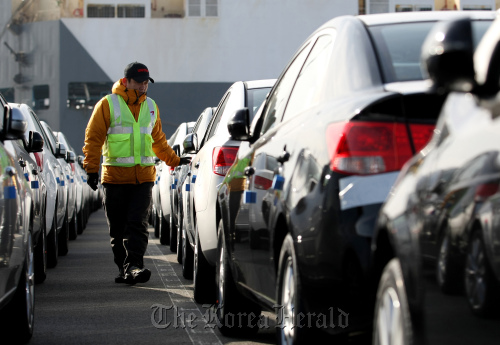Toyota and other Japanese car sales down more than a fifth in June
Local automakers led by Hyundai, Kia and SsangYong reported all-time high sales with double-digit growth in the first half, benefiting from the demand-drop for Japanese vehicles after the March earthquake.
Domestic sales at Hyundai Motor Co., the industry leader, jumped 7.2 percent on-year to 344,422 units in the January-June period. Hyundai’s overseas performance was even better, posting a sales increase of 10.6 percent in the same period.
Its affiliate Kia Motors and SsangYong Motor Co. were also particularly strong abroad, with Kia posting a 30.8 percent and SsangYong 65.3 percent increase in sales in the same period.
Korean carmakers’ extended industry-beating performance has particularly stood out this year since March, as quake-hit Japanese rivals suffered from supply shortages.
 |
A worker inspects vehicles bound for export at the port in Pyeongtaek, Gyeonggi Province. (Bloomberg) |
Analysts also attribute the strong performance of Korean cars to the local industry’s no-frills, safe manufacturer image which met buyer expectations in the aftermath of the 2008-9 global financial crisis.
“There is pent-up demand for cars in the United States after the market collapsed in the wake of the global financial crisis,” Yoon Phil-joong, an analyst at Samsung Securities was quoted as saying.
“Consumers also place value on practicality during difficult economic times. Korean car makers are relatively safe,” he said.
The combined overseas sales of five local automakers ― Hyundai, Kia, SsangYong, Renault Samsung SA and GM Korea ― jumped 16.7 percent on-year in June. Combined with their domestic sales, the five sold a total of 683,703 cars in June, up 14.6 percent from 596,630 cars sold a year before.
Demand for Japanese cars, in contrast, fell by a third in May and June.
The top three Japanese automakers ― Toyota Motor, Nissan Motor and Honda Motor ― all are still suffering from supply shortages from not being able to produce a few critical components but said they are recovering fast.
Japan, the world’s third biggest car market, shrank 22 percent in terms of sales with only 351,828 vehicles sold in June.
Nissan took its first upturn in sales in nine months, posting an increase of 4.2 percent on-year sales in June. Toyota and Honda suffered more than 30 percent of on-year sales decline in the same month. The industry is widely expecting Korean carmakers to extend their strong performance but they are warned of the slowing global recovery in the second half.
“The slowing global economy may deal a blow to consumer sentiment.” Yoon reportedly said.
Hyundai Motor America CEO John Krafcik attributes the company’s strong performance in the U.S. to achieving fuel economy faster and more cheaply. He said the best way to reduce America’s fuel consumption would be to mass produce the most efficient technologies such as direct-injected engines, as applied on Hyundai Avante and Elantra.
“That’s why we’re leading the industry in fuel efficiency and 40 MPG vehicle sales, and it’s certainly a big driver of our overall sales growth this year,” Krafcik said.
By Cynthia J. Kim (
cynthiak@heraldcorp.com)








